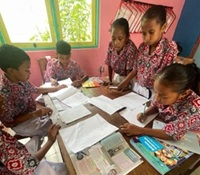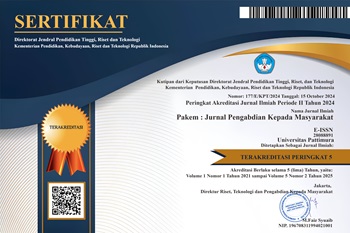MATEMATIKA VISUAL: MENUMBUHKAN PEMAHAMAN KONSEP MELALUI VIDEO EDUKATIF
Abstract
Mathematics learning in elementary schools focuses on the development of conceptual understanding aimed at enhancing logical, analytical, and creative thinking skills, as well as their ability to solve real-life problems. Conceptual understanding of mathematics can be achieved through various approaches, one of which is the utilization of technology-based learning media, such as educational videos. The topics of Least Common Multiple (LCM) and Greatest Common Divisor (GCD) are among the essential materials taught in elementary schools that often cause difficulties for students in understanding and applying the concepts correctly. The community service activity aims to improve students’ understanding of mathematical concepts, particularly LCM and GCD, through the implementation of technology-based learning using educational videos. In addition, the activity seeks to foster students’ learning motivation and interest in mathematics and to provide teachers with innovative and engaging alternative teaching methods. The implementation method consists of three main stages: (1) preparation of learning media, including educational videos and student worksheets (LKPD), (2) classroom implementation at State Elementary School 283, Central Maluku Regency, where students watched the educational videos, worked in small groups of 4 -5 to complete the worksheets, and presented their results in front of the class, and (3) reflection, in which students provided written feedback on their learning experiences. The results indicate that the use of educational videos in mathematics learning effectively enhanced students’ understanding of LCM and GCD concepts, created a more interactive and enjoyable learning atmosphere, and increased students’ enthusiasm for learning. Teachers also benefited from the activity, as it provided a more engaging and effective teaching approach. Overall. The program successfully achieved its objectives and is expected to continue to further deepen students’ mathematical understanding and improve the quality of mathematics learning in elementary schools
Downloads
References
Adib, M. (2022). Pengembangan multimedia interaktif berbasis adobe flash cs 6 pada pelajaran matematika materi KPK dan FPB. Jurnal Kajian Pendidikan, 16(1). https://doi.org/10.30595/jkp.v16i1.12674
Agustin, A., Sahari, S., & Nursalim, N. (2025). Keefektifan media animasi 2D untuk meningkatkan hasil belajar siswa pada mata pelajaran matematika materi KPK dan FPB. Pendas: Jurnal Ilmiah Pendidikan Dasar, 10(2), 755–765. https://doi.org/10.23969/jp.v10i2.28180
Ayunda, Y., Azmi, D. I., & Suhartatik, S. (2024). Analysis of the use of animated video learning media on the science learning motivation of junior high school students. Jurnal Pembelajaran Sains, 8(2), 94–101. https://doi.org/10.17977/um033v8i2p94-101
Baptist, P. (2011). Towards new teaching in mathematics. Universitas Bayreuth. https://eref.uni-bayreuth.de/29521/
Kartika, R. D., & Apriza, B. (2025). The effectiveness of using animated videos in learning mathematics to improve student learning outcomes in elementary schools: A systematic literature review. Indonesian Journal of Educational Research and Review, 8(1), 244–259. https://doi.org/10.23887/ijerr.v8i1.88016
Medina Herrera, L. M. (2020). The use of videos to develop and evaluate mathematical skills. Proceedings of the 2020 ACM Conference on Innovation and Technology in Computer Science Education, 285–286. https://doi.org/10.1145/3392305.3396900
Melani, M., Yusri, F., & Adriyanti, L. (2024). Meningkatkan motivasi belajar dengan penggunaan vidio pembelajaran di MtsS Asy-Syarif Sidang Koto Laweh. JISPENDIORA: Jurnal Ilmu Sosial, Pendidikan Dan Humaniora, 3(1), 244–251. https://doi.org/10.56910/jispendiora.v3i1.1250
Nabila, I., Santoso, K. M. N., & Kusno, K. (2025). Joyful learning dalam pembelajaran matematika: Studi literatur. *Indo-MathEdu Intellectuals Journal, 6*(3), 4089–4099. https://doi.org/10.54373/imeij.v6i3.3236
Nurhasanah, A., Pribadi, R. A., & Suhayati, S. (2022). Efektivitas penggunaan media papan musi (multi fungsi) pada materi KPK dan FPB kelas IV SD. Jurnal Ilmiah Telaah, 7(1), 61–67. https://doi.org/10.31764/telaah.v7i1.6619
Pattimukay, N. (2023). Asistensi mengajar: Penerapan pendekatan realistic mathematics education dalam pembelajaran matematika di SMP Negeri 49 Maluku Tengah. PAKEM: Jurnal Pengabdian Kepada Masyarakat, 3(1), 56–61. https://doi.org/10.30598/pakem.3.1.56-61
Rahmawati, A., & Setiawan, B. (2025). Inovasi media komik bermuatan ESD untuk meningkatkan pemahaman konsep matematika sekolah dasar. Action Research Journal Indonesia, 7(3). https://doi.org/10.61227/arji.v7i3.493
Rahmawati, D. (2023). Penggunaan media pembelajaran aplikasi video dalam meningkatkan minat belajar siswa di MIN 7 Nganjuk. Jurnal Bima, 1(3), 256–265. https://doi.org/10.61132/bima.v1i3.173
Riaddin, D. (2022). The effect of learning videos on students’ mathematical abilities: A meta-analysis study. eduMa: Mathematics Education Learning and Teaching, 11(2), 223–234. https://doi.org/10.24235/eduma.v11i2.11463
Suherman, E. (2019). Strategi pembelajaran matematika kontemporer. Alfabeta.
Teapon, N., & Kusumah, Y. S. (2023). The development of smartphone-based mathematics learning media: Systematic literature review (SLR). Proceedings of the 2023 2nd International Conference on Computer Technology and Media Convergence Design (ICTCMD 2023), 96–102. https://doi.org/10.1145/3637989.3637992

Copyright (c) 2025 PAKEM : Jurnal Pengabdian Kepada Masyarakat

This work is licensed under a Creative Commons Attribution-NonCommercial-ShareAlike 4.0 International License.
Authors who publish with PAKEM: Jurnal Pengabdian Kepada Masyarakat agree to the following terms:
- Authors grant copyright to the journal and right of first publication with the work simultaneously licensed under a Creative Commons Attribution License (CC BY-NC-SA 4.0)
- Authors are able to enter into separate, additional contractual arrangements for the non-exclusive distribution of the journal's published version of the work (e.g., post it to an institutional repository or publish it in a book), with an acknowledgment of its initial publication in this journal.
- Authors are permitted and encouraged to post their work online (e.g., in institutional repositories or on their website) prior to and during the submission process, as it can lead to productive exchanges, as well as earlier and greater citation of published work.

1.png)













